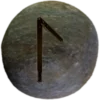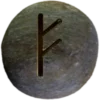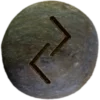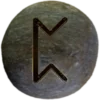Last Updated on December 9, 2024
Table of Contents


Ótr (pronounced OH-ter, with a rolled r) appears in tales such as the Völsunga saga and Skáldskaparmál. Ótr, meaning “otter” in Old Norse, was a dwarf known for his unique shapeshifting ability. He often transformed into an otter to fish in rivers and enjoy his surroundings. This talent made him distinct among his kin. The story of Ótr centers around his tragic fate and its consequences.
One day, while in otter form, Ótr was killed by Loki, who mistook him for a simple animal. Loki and his companions, Odin and Hœnir, skinned Ótr and carried the pelt. When they sought hospitality at the home of Hreiðmarr, Ótr’s father, the truth of his death emerged. Hreiðmarr demanded compensation in the form of a massive ransom. The skin of Ótr had to be filled with gold and covered completely to settle the debt.
This event led to the creation of the cursed treasure of Andvari, a hoard that brought ruin to those who owned it. Andvari’s ring, Andvaranaut, became part of this treasure and carried its curse onward. The story emphasizes themes of greed, vengeance, and the unintended consequences of actions. Ótr’s tale appears in the Prose Edda and remains a critical link in the chain of events that shaped the fate of Sigurd and the Völsung lineage.
Ótr represents the thin boundary between human-like beings and nature. His dual identity as dwarf and otter highlights the blend of magical and earthly elements in his character. His story weaves together pivotal themes of transformation, justice, and the burden of wealth.
Elder Futhark Runes Associated with Ótr 
The Laguz rune (ᛚ), pronounced “lah-gooz,” represents water, intuition, and flow. This rune connects with Ótr’s affinity for rivers and his otter form. His time spent in water reflects the rune’s associations with adaptability and the subconscious.
The Fehu rune (ᚠ), pronounced “fay-hoo,” symbolizes wealth and prosperity. It ties to the ransom of gold that Ótr’s death demanded. This rune reflects the tension between material riches and their cost, a central theme in Ótr’s story.
Both runes connect Ótr to natural forces and wealth, underscoring his duality and the consequences of his tale.
Ótr’s Importance to Asatruar
To Asatruar, Ótr represents transformation, justice, and the complexities of wealth. His story warns of greed’s destructive nature while showcasing the power of nature’s forces. The demand for recompense following his death reminds modern practitioners of the need for accountability and balance.
Ótr’s dual form bridges the realms of human-like beings and the animal kingdom. This connection resonates with those who value harmony with nature. His story also emphasizes the ripple effects of actions, which can lead to unintended consequences.
Ótr’s tale invites reflection on responsibility, interconnectedness, and the pursuit of justice. Asatruar often see his story as a reminder of the importance of maintaining harmony within communities and with nature.


